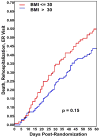Obesity and the response to intensified diuretic treatment in decompensated heart failure: a DOSE trial substudy
- PMID: 23141856
- PMCID: PMC3498464
- DOI: 10.1016/j.cardfail.2012.09.005
Obesity and the response to intensified diuretic treatment in decompensated heart failure: a DOSE trial substudy
Abstract
Background: Obesity could attenuate diuretic effectiveness in treatment of acute decompensated heart failure (HF).
Methods and results: The DOSE trial randomized 308 subjects with acute HF to low- versus high-intensification intravenous diuretic therapy. We tested for statistical interactions between obesity and dosing strategy across clinical end points. After 72 hours of treatment, obese subjects (body mass index >30 kg/m(2); n = 173) had greater volume loss than nonobese subjects (n = 119) but similar improvements in dyspnea and freedom from congestion. Both groups had greater fluid loss with high-intensification treatment. Obese subjects had a higher incidence of worsening renal function (WRF) at 72 hours with low-intensification treatment, compared with nonobese subjects. In contrast, nonobese and obese subjects had similar incidence of WRF with high-intensification treatment. There were no differences between obese and nonobese subjects in time to discharge and 60-day freedom from death, emergency department visit, or rehospitalization.
Conclusions: The incidence of WRF was greater in obese than in nonobese subjects with low-intensification treatment. However, the frequency of WRF was equivalent in obese and nonobese subjects with high-intensification treatment. Additional studies are needed to assess whether obese patients with acute HF benefit from an initial high-intensification treatment strategy.
Published by Elsevier Inc.
Figures



Similar articles
-
Impact of dopamine infusion on renal function in hospitalized heart failure patients: results of the Dopamine in Acute Decompensated Heart Failure (DAD-HF) Trial.J Card Fail. 2010 Dec;16(12):922-30. doi: 10.1016/j.cardfail.2010.07.246. J Card Fail. 2010. PMID: 21111980 Clinical Trial.
-
Effect of admission oral diuretic dose on response to continuous versus bolus intravenous diuretics in acute heart failure: an analysis from diuretic optimization strategies in acute heart failure.Am Heart J. 2012 Dec;164(6):862-8. doi: 10.1016/j.ahj.2012.08.019. Epub 2012 Oct 29. Am Heart J. 2012. PMID: 23194486 Free PMC article. Clinical Trial.
-
Poor concordance between different definitions of worsening renal function in patients with acute exacerbation of chronic heart failure: a retrospective study.Minerva Cardioangiol. 2016 Apr;64(2):127-37. Epub 2014 Nov 25. Minerva Cardioangiol. 2016. PMID: 25423291
-
Fluid removal in acute heart failure: diuretics versus devices.Curr Opin Crit Care. 2014 Oct;20(5):478-83. doi: 10.1097/MCC.0000000000000134. Curr Opin Crit Care. 2014. PMID: 25111680 Review.
-
Medical therapy for acute decompensated heart failure: what recent clinical trials have taught us about diuretics and vasodilators.Curr Heart Fail Rep. 2012 Mar;9(1):1-7. doi: 10.1007/s11897-011-0072-6. Curr Heart Fail Rep. 2012. PMID: 21874282 Review.
Cited by
-
Advanced Hemodynamic Monitoring Allows Recognition of Early Response Patterns to Diuresis in Congestive Heart Failure Patients.J Clin Med. 2022 Dec 21;12(1):45. doi: 10.3390/jcm12010045. J Clin Med. 2022. PMID: 36614848 Free PMC article.
-
The impact of high-salt diet and diuretics on the development of the aestival phenomenon in patients with chronic heart failure.Front Nutr. 2025 Jul 22;12:1538962. doi: 10.3389/fnut.2025.1538962. eCollection 2025. Front Nutr. 2025. PMID: 40765740 Free PMC article.
-
Diabetes Mellitus and Heart Failure With Preserved Ejection Fraction: Role of Obesity.Front Physiol. 2022 Feb 15;12:785879. doi: 10.3389/fphys.2021.785879. eCollection 2021. Front Physiol. 2022. PMID: 35242044 Free PMC article. Review.
-
Treatment options for heart failure in individuals with overweight or obesity: a review.Future Cardiol. 2025 Apr;21(5):315-329. doi: 10.1080/14796678.2025.2479378. Epub 2025 Mar 18. Future Cardiol. 2025. PMID: 40098467 Review.
References
-
- Flegal KM, Carroll MD, Ogden CL, Curtin LR. Prevalence and trends in obesity among us adults, 1999–2008. JAMA. 2010;303:235–241. - PubMed
-
- Howel D. Trends in the prevalence of obesity and overweight in english adults by age and birth cohort, 1991–2006. Public Health Nutr. 2011;14:27–33. - PubMed
-
- Kenchaiah S, Gaziano JM, Vasan RS. Impact of obesity on the risk of heart failure and survival after the onset of heart failure. Med Clin North Am. 2004;88:1273–1294. - PubMed
-
- Berenson GS, Srinivasan SR. Emergence of obesity and cardiovascular risk for coronary artery disease: The bogalusa heart study. Prev Cardiol. 2001;4:116–121. - PubMed
Publication types
MeSH terms
Substances
Grants and funding
LinkOut - more resources
Full Text Sources
Medical
Research Materials
Miscellaneous

